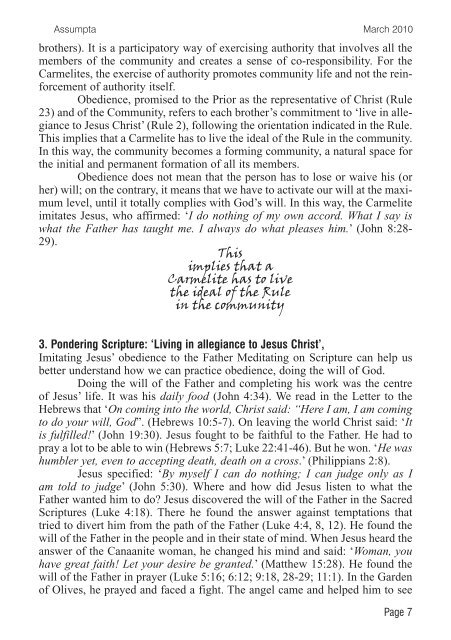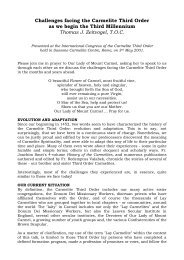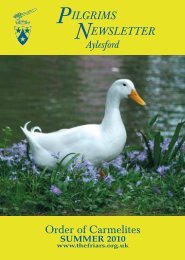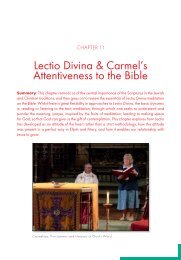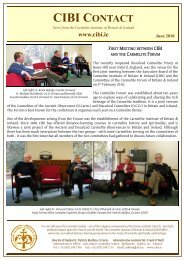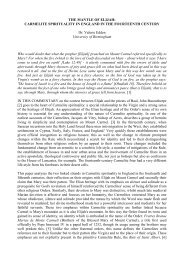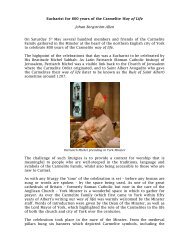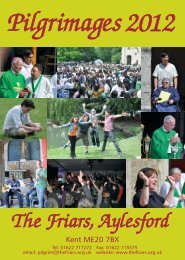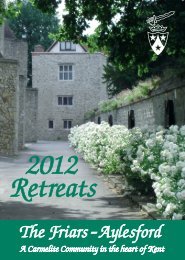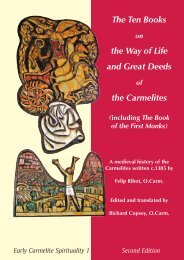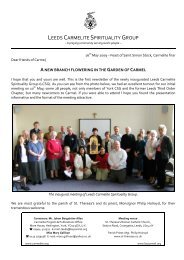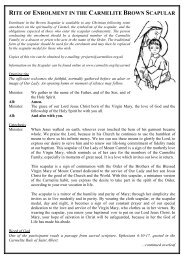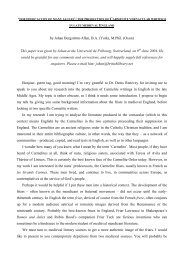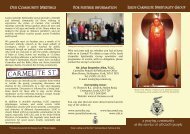Assumpta - British Province of Carmelite Friars
Assumpta - British Province of Carmelite Friars
Assumpta - British Province of Carmelite Friars
Create successful ePaper yourself
Turn your PDF publications into a flip-book with our unique Google optimized e-Paper software.
<strong>Assumpta</strong> March 2010<br />
brothers). It is a participatory way <strong>of</strong> exercising authority that involves all the<br />
members <strong>of</strong> the community and creates a sense <strong>of</strong> co-responsibility. For the<br />
<strong>Carmelite</strong>s, the exercise <strong>of</strong> authority promotes community life and not the reinforcement<br />
<strong>of</strong> authority itself.<br />
Obedience, promised to the Prior as the representative <strong>of</strong> Christ (Rule<br />
23) and <strong>of</strong> the Community, refers to each brother’s commitment to ‘live in allegiance<br />
to Jesus Christ’ (Rule 2), following the orientation indicated in the Rule.<br />
This implies that a <strong>Carmelite</strong> has to live the ideal <strong>of</strong> the Rule in the community.<br />
In this way, the community becomes a forming community, a natural space for<br />
the initial and permanent formation <strong>of</strong> all its members.<br />
Obedience does not mean that the person has to lose or waive his (or<br />
her) will; on the contrary, it means that we have to activate our will at the maximum<br />
level, until it totally complies with God’s will. In this way, the <strong>Carmelite</strong><br />
imitates Jesus, who affirmed: ‘I do nothing <strong>of</strong> my own accord. What I say is<br />
what the Father has taught me. I always do what pleases him.’ (John 8:28-<br />
29).<br />
This<br />
implies that a<br />
<strong>Carmelite</strong> has to live<br />
the ideal <strong>of</strong> the Rule<br />
in the community<br />
3. Pondering Scripture: ‘Living in allegiance to Jesus Christ’,<br />
Imitating Jesus’ obedience to the Father Meditating on Scripture can help us<br />
better understand how we can practice obedience, doing the will <strong>of</strong> God.<br />
Doing the will <strong>of</strong> the Father and completing his work was the centre<br />
<strong>of</strong> Jesus’ life. It was his daily food (John 4:34). We read in the Letter to the<br />
Hebrews that ‘On coming into the world, Christ said: “Here I am, I am coming<br />
to do your will, God”. (Hebrews 10:5-7). On leaving the world Christ said: ‘It<br />
is fulfilled!’ (John 19:30). Jesus fought to be faithful to the Father. He had to<br />
pray a lot to be able to win (Hebrews 5:7; Luke 22:41-46). But he won. ‘He was<br />
humbler yet, even to accepting death, death on a cross.’ (Philippians 2:8).<br />
Jesus specified: ‘By myself I can do nothing; I can judge only as I<br />
am told to judge’ (John 5:30). Where and how did Jesus listen to what the<br />
Father wanted him to do Jesus discovered the will <strong>of</strong> the Father in the Sacred<br />
Scriptures (Luke 4:18). There he found the answer against temptations that<br />
tried to divert him from the path <strong>of</strong> the Father (Luke 4:4, 8, 12). He found the<br />
will <strong>of</strong> the Father in the people and in their state <strong>of</strong> mind. When Jesus heard the<br />
answer <strong>of</strong> the Canaanite woman, he changed his mind and said: ‘Woman, you<br />
have great faith! Let your desire be granted.’ (Matthew 15:28). He found the<br />
will <strong>of</strong> the Father in prayer (Luke 5:16; 6:12; 9:18, 28-29; 11:1). In the Garden<br />
<strong>of</strong> Olives, he prayed and faced a fight. The angel came and helped him to see<br />
Page 7


